Tosh Berman's Blog, page 177
September 3, 2016
Unica Zürn by Tosh Berman

There are lives that are so painful. I shutter when I hear the name Unica Zürn. Her life was not a bundle of warm joy, but more of a gothic horror story than anything else. A brilliant artist and writer, but covered in the cloak of pure misery, and being a woman in that social setting of the arts in the 20th century - is not that totally hopeful or beneficial to her fragile state of mind. Yet, she did remarkable works of art. Her partner-in-art-crime was the artist Hans Bellmer, who is known for his work with doll parts. Disturbing sculptures of limbs torn apart, and then re-placed in a creative fashion. Highly sexualized, as well as being demented, in other words a great artist. Zürn and Bellmer, if this was a work of fiction, this would be a perfect match-up. Alas, the truth is painful.

She was 37 when she met Bellmer (he was 51), and came from a very troubled background. More likely she was sexually abused by her older brother, had a father whom she adored but he wasn’t around much, and his third wife, the mother of Unica, was detested by the daughter. She had a job with UFA, the German film company, at the height of the Third Reich, and was married to a much older man, where she had two children. They divorced some years later, and she lost custody of her two children due to her mental problems. During the 40s and early 1950s, she was described as a happy person. Then she met and moved in with Hans.
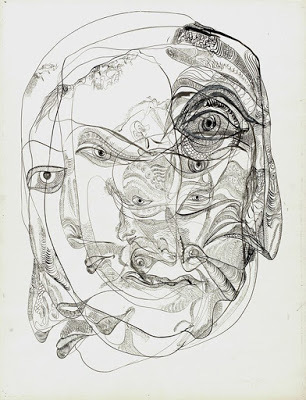
Throughout her adulthood, Zürn was a remarkable artist, who totally used her madness or illness as a springboard for her work. She wasn’t an “outside” artist. Zürn was totally conscious of what she was doing. She has been compared to Anton Artaud, who both, shared the same doctor. And both, Zürn and Artaud were obsessed with their mental state or illness. This, I find, to be a tricky situation. I have always been attracted to the artist who’s mentally ill. In fact, I collect books on these figures. The thing is, as I dwell into their work and madness, I sort of forget about the pain that they live with. Blame it on my love for the surface, but often I miss the textures and deepness of such artists as Unica Zürn. This, I finally got over the complex, and now, I see her work beyond her illness.

I’m not going to lie. Zürn is a very attractive woman to me. As I look at photographs of her, I can detect disturbance, but also the beauty of her face. The yin and yang, or opposites that gives so much textural levels. I sense her madness opened up a horrible world for her, yet, it’s the source that gave her the tools of her art. She used those tools wisely, even though her life wasn’t a happy one. I have read bits and pieces of her literature, but it is mostly the drawings that draw (no pun intended) me into her world. These inks work on paper is sort of like a map, but not one that shows a direction or destination. A landscape of her inner-thinking. Zürn has powerful eyes, and that is one of the main visual themes in her drawings. Some are human faces, but also eyes from a beast, creature or demon. They’re disturbing, but also very beautiful. Her technique is exquisite, and very refined.

It’s not surprising that Bellmer used her as a muse - which can be a deadly position to be in for a human being. The idealized figure for inspiration can leave one feeling empty, in such a relationship. Life, or lives, is what it is that lasts in one’s lifetime. Yet, art, does have the ability to go beyond that lifeline. But often comes with a price. All reports say that their relationship was a hard one. He photographed her in various poses naked or half naked, but tied up with rope or string - where she resembles the discarded doll parts of his artwork. I now wonder if his work is more of ‘their’ work. A collaboration not only between lovers, but also as artists. I suspect she brings in something more than just inspiration. The photographs that he took of her, as a tied-up piece of sculpture, can be seen, on the surface, of one dominating over the other. But I wonder if that’s true. I suspect that she was very much part of the process in these photographs. I don’t think she’s a passive personality, at least, I don’t get that aspect of her personality through her work.
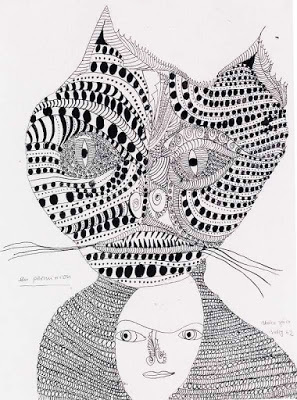
Hans Bellmer very much looks like the perverse evil demented artist. I haven’t seen every image of Bellmer, but not one so far, is he fancy-free and smiling. Nor does she smile. Happy-go-lucky couple they ain’t! Nevertheless they both produced work that is erotic, thoughtful, disturbing, and for me, painful. Not his life so much, but just reading about Zürn’s narrative and how things just got darker for her. She suffered from bad effects of an abortion as well as mental pain regarding her life as an artist and a partner-in-art-crime with Bellmer, and both suffered from severe money issues as well. To me, there is nothing sadder of the fact he told her he couldn’t take care of her, due to his severe stroke at the time. It was around this time she decided to go out of their fifth story window. There’s a lot of tragedy connected to her art. It’s not a good-feel trip through the park. It is more like a walk in the Grimm Brothers’ park within a dark forest, and yes, one can imagine human limbs hanging from the trees.

It’s fascinating that a lot of artists who use the pen on paper, are also writers. Off the top of my head I think of Jean Cocteau, Artaud, Denton Welch, and Boris Vian, among many others. Zürn, I feel, needed both mediums. I suspect that one medium leads into the other - and writing/drawing was very much of the standard Surrealist practice - and she and Bellmer were close to that movement. Zürn serves many purposes. One as a person who was very much part of the Surrealist world, in their later years, and her work with another artist - Bellmer. But we have to remind ourselves what she put on the table. Which was very much her drawings and profound writings/novels that pretty much exposed her inner-thoughts as well as the position of a woman in the arts - either used as a muse, but more likely a collaborator who put more than her two cents in the soup. Beautiful, brilliant, and a great artist - that’s Unica Zürn in a nutshell.
Published on September 03, 2016 14:31
September 2, 2016
August 29, 2016
August 25, 2016
"The Age of Bowie" by Paul Morley (Gallery Books)
 ISBN: 978-5011-5115-6 I for one am very grateful to live in the 'Age of Bowie." I can't think of another artist who either took me to other places, or I felt I could have a discussion with this artist about those places. I never had an eye-to-eye chat with Bowie, except to recommend a Japanese bookstore in Downtown Los Angeles - still, such a remarkable music maker and cultural advisor. Paul Morley's book on Bowie is exactly what one would think, if you have read Morley's other books and articles on the subject matter of pop music. Morley is not a 'it has a nice beat, and I give it a five' type of commentator - he's more of a Walter Benjamin, but happily placed in the world of the pop music world.
ISBN: 978-5011-5115-6 I for one am very grateful to live in the 'Age of Bowie." I can't think of another artist who either took me to other places, or I felt I could have a discussion with this artist about those places. I never had an eye-to-eye chat with Bowie, except to recommend a Japanese bookstore in Downtown Los Angeles - still, such a remarkable music maker and cultural advisor. Paul Morley's book on Bowie is exactly what one would think, if you have read Morley's other books and articles on the subject matter of pop music. Morley is not a 'it has a nice beat, and I give it a five' type of commentator - he's more of a Walter Benjamin, but happily placed in the world of the pop music world. There is nothing new to read in "The Age of Bowie," if you're a long-term fan of David's work - nor is there any really new insights into the Bowie world, if you read the many (and many) books that are out there on Bowie, and which to be honest, are pretty good. What you do get is the unique voice of Morley, and in a sense this book is more about Paul Morley than David Bowie. And this, is a very good thing. For one, this book was written quite quickly, in honor of Bowie's passing, but it is also a reflection on the pop eras that has passed for Morley as well. most of the chapters, he lists records that were released during Bowie's own releases - and it gives the book a really nice framework.
It also focuses on Bowie's obsessions and interests - and how that sneaked or became part of his music. Morley has a really good understanding of Bowie's work, and he's a fan, but he's not an emotional lunatic fan like me. He's like a detective going through the evidence and cooly remarking on each item that is on file. The book will not please all Bowie fans, but it's a must for Bowie fans to read. One of the many things I like about this book is that it's not a closed conversation, but a very open one - where readers can add their own thoughts and commentary. It is also not an album-by-album critique - but clearly an over-all approach to the Bowie magic. David Bowie was (and still is,) a superb adventure. This book is one of a few that take that adventure and go with it.
Published on August 25, 2016 13:44
August 18, 2016
"Conversations with Robert Evans" by Lawrence Grobel
 Rat Press
Rat PressI'm on a Lawrence Grobel kick. This being the second book I have read by him - the first was "Conversations with Marlon Brando." This one is "Conversations with Robert Evans," who is a film producer, and one time the main honcho at Paramount Pictures. Evans, at the moment, is an idol of sorts for those who love the idea of Hollywood, especially mixing a certain amount of contempt and adoration. Evans is a superb hustler, who I suspect is not into the money, but more of the lifestyle - and that, he's really good at it. Classically good looking, he strikes one as an iconic figure, who will risk all, to make the movie of his dreams. And perhaps he did. He made a lot of good films, or was involved in a lot of good movies, yet again, it's more of an appreciation of a system than anything else. Throughout the interview or conversation with Grovel, he seems to consistently go into his press files - which seems huge. He's a guy who lives in the public landscape, and will die in the public eye. On the other hand, he has a pretty magnificent life - and I think for us amateur hustlers, this is something that is a goal to reach. Therefore, sadness is right behind us, and walking among us mortals.
Published on August 18, 2016 17:37
August 17, 2016
"Conversations with Marlon Brando" by Lawrence Grobel
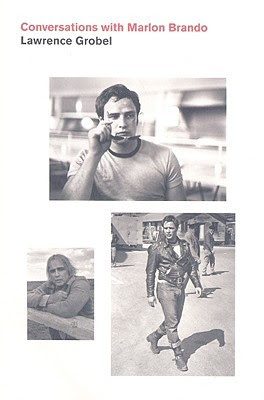
Marlon. Brando. Icon. Also a very thoughtful man, if he's interested in the subject matter or having a conversation with a writer/journalist he admires or likes. I never was obsessed with Brando or his films, I like them, like I like ice cream, but I don't obsess about the cream. On the other hand, many people do obsess over Brando, especially regarding his personality, and his dislike of the acting profession - which I think is not true.
He doesn't like 'professions' in general. But clearly he does like acting, and I think the reason he likes it, is because he's a very curious sort of guy. He likes to research and learn. And I think a big part of acting is the research part, and the ability to watch and listen to others. He's also quite funny in this book which is pretty much in the Q&A format. Clearly he asked for, and insisted, that this interview would deal with issues of the Native American world, and the horrible things that were done to these people. And in actuality, the best part of the book is Brando putting his thoughts and articulating his 'anger' regarding how the American Indian was treated in its past and also, in contemporary times. He's very observational and extremely smart fellow. And yes, he does talk about acting - but he doesn't gossip. Except for his dislike of Charlie Chaplin, because he treated his son very mean or rude manner. Also his brief commentary on Tennessee Williams, Kazan, is interesting. Again, he's a very talented observer and I suspect that if you are a friend of Marlon Brando, then he's a friend for life. It seems he has a series of long term friendships from people he grew up with. An interesting little book.
Published on August 17, 2016 19:29
August 12, 2016
"ANICET or the PANORAMA" by Louis Aragon (Atlas Press)
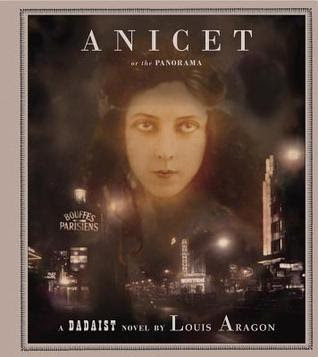 ISBN: 978-1-90065-69-1 Atlas Press"ANICET or the PANORAMA (Atlas) by Louis Aragon
ISBN: 978-1-90065-69-1 Atlas Press"ANICET or the PANORAMA (Atlas) by Louis AragonThe beauty of DADA is that it came from total disaster, in other words, total destruction. Out of the ashes of World War One, came DADA. Like pollen floating in an air stream across Europe, writers/artists got a whiff of it, and it stayed within their DNA. Perhaps the first literature to come out of the French DADA world is Louis Aragon's "Anicet or the Panorama." It's a dis-jointed tale of crime life, but told by a writer that is not overly concern about narration from A to Z. That map is re-written by Aragon, who uses the life surrounding him at the time, which means Andre Breton, Max Jacob, Picasso, and others, who all make an appearance in this work of "fiction."
World War 1 changed the young doctor Aragon, and the future World War 2, will change him again. So what we have here is a very young Aragon facing up to, as well as articulating the world around him - which is Paris 1918/1919. A snapshot of the time especially with the cinematic references (Pearl White serials, Fantomas) but nevertheless, a snapshot taken by a poet with his poetic sensibilities in place.
Once again, Atlas Press, goes beyond their duty to come out with another beauty of a production, which is this book.
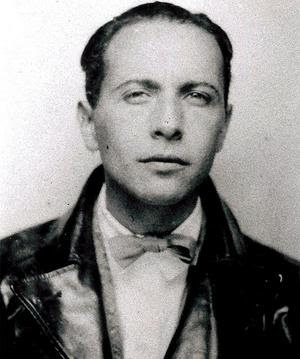
Published on August 12, 2016 14:20
August 10, 2016
Eva Hesse by Tosh Berman

German born, Jewish and of course, had to be on the move during her childhood in the 1940s, Eva Hesse lived an intense short life. She died at the age of 34. Yet she is the gift that keeps on giving. Like my other favorite artist, Yves Klein, who also died at the age of 34. Both artists, when I look at their work, deals with life as a force to reckon with - it’s not about early death, but living life intensely and correctly. That word “correctly” has a moral tinge to it, and I don’t mean it in that sense. For these two artists, there were choices in front of them, and both made the correct decisions. Hesse had a rather odd and complicated family life - a manic - depressive mother including a step-mom who had the same name as her, but also suffered from brain cancer. Apparently within weeks of Hesse’s actual illness.
Hesse worked in the medium of paint, but also did sculptures using latex, fiberglass, and plastics. There is for sure a substantial argument for and against the lasting of the material she used in her art work, but I feel Hesse knew her art pieces wouldn’t last forever due to the material she chose for her sculptures. There’s a beauty in thought, knowing what you leave on this mortal earth will not last. I often think of her sculptures in that light. There are two works of art displayed in the current exhibition “Revolution in the Making” at Hauser Wirth & Schimmel by Hesse.
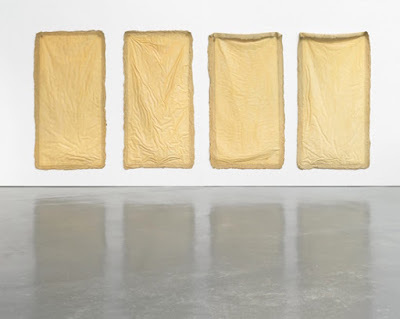 Eva Hesse "Aught"
Eva Hesse "Aught"“Aught” is four canvases with latex and filler stretched over it. The photograph here (images give a hint of an artwork, but one really needs to see certain works in person) doesn’t show the fragility of the work. Each canvas is different from the other. Either by coloration or the aging of the work. I could be wrong, but the four individual pieces that make up this work of art, I think, would have been identical, at the time they were made.
Marcel Duchamp’s famous large glass art piece, covered by dust, and photographed by Man Ray is another work, that comments on time and how it affects art. Not exactly a decay in the same sense of Hesse’s work, but the awareness of the passing of time, and to me, an obvious reflection or meditation. It seems, when you read about her, Hesse’s life must have been difficult - yet the work she produced, is to me, a delight. “Aught” changes over time, and that is what makes the work so powerful and beautiful. Yet, it’s a work that needs to be re-visited many times. The show has been up for four months already, so I come back to “Aught” repeatedly, and I feel each time I look at it, there is some sort of change - which I suspect it is more how I look at an object or art, but nevertheless, there is something about it that changes. I imagine if you’re the owner, you can look at this work on a consistent basis for decades, noticing a change here or there - but for us (the others) we can only see it for short periods of time. So with respect of time passing, it is not our time that is going by, but the work itself that is commenting on that passage from one point to another.
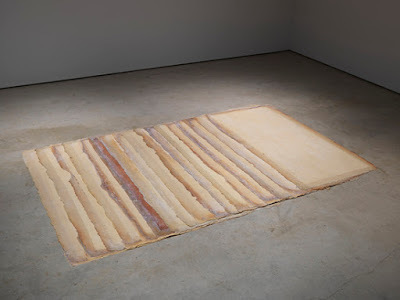 Eva Hesse "Augment"
Eva Hesse "Augment" “Augment” is a funny title for the other piece that is in the exhibition. It’s layers of latex canvases that are laid on the floor on top of each other. It’s a beautiful piece of sculpture, but it reads like a painting to me. I think due to its flatness, but it is 17 units or individual pieces that make up “Augment.” I don’t see this work as a passage of time, or dealing with decay -but more of a design that is somewhat hypnotic, and for some odd (unexplained) reason reminds me of layers of bacon on a plate. And although I do not eat bacon, I think the bacon itself is a beautiful looking meat. Yet, it’s the repetition of the pieces that give it a funny aspect, where one approaches this work as almost like slices of a whole bread loaf. There is a natural or environmental aspect of the work, but I don’t feel that is the intention. I think it’s more of the fact that it exists, and that is the sole purpose of this work. Seeing layers of the same thing is kind of funny in an absurd manner. I read an interview with Hesse, that is in the “October Files” series, where she mentioned that repetition in her work is - “Because it exaggerates. If something is meaningful, maybe it’s more meaningful said ten times. It’s not just an aesthetic choice. If something is absurd, it’s much more really exaggerated, absurd, if it’s repeated.” So, “Augment” works in that absurdity, but it is also a pleasure for the eye. It relaxes me, and perhaps it the repetition of seeing the same object over and over again, that gives me such contentment. “Augment” and “Aught” are separate works, but they are also a brother and sister or two sisters - nevertheless, it’s in the same family. It was shown together only once in 1968, and this is the first time in 48 years that these two pieces have been rejoined, for this specific exhibition at Hauser, Wirth & Schimmel. Artworks in a room tend to have a dialogue between themselves, and if you look, one can make connections between the two pieces. “Aught” can mean ought, which suggests a sense of duty or responsibility. “Augment” is making something greater, by adding to it. So “Aught is four individual pieces hanging on the wall, and then finally on the ground you get 17 pieces which make up “Augment.” The visual and word pun is Duchampian in a sense, but it also plays with the concept that ‘more is better than less.’
As I mentioned, I’m often drawn to the Eva Hesse works in this exhibition, because it suits my hungry eye, but also there is something provocative and funny about these two works - and now that they are together, I feel a bit more of a whole person. Perhaps, you will feel the same.
Published on August 10, 2016 09:15
August 8, 2016
Jimmy Page: 'Lucifer Rising' (Original Soundtrack)
I'm always disappointed when a major music figure doesn't follow their muse more. Jimmy Page seemed to be on the right path with respect to this music he put together for Kenneth Anger's film "Lucifer Rising." A musician in his studio making music. It's a superb piece of work. The best thing he has ever done. I know he did a limited-edition release of this album, and only on vinyl. Sadly I don't have it, nor the recording above. But it's a beauty.
- Tosh Berman
Published on August 08, 2016 06:56



